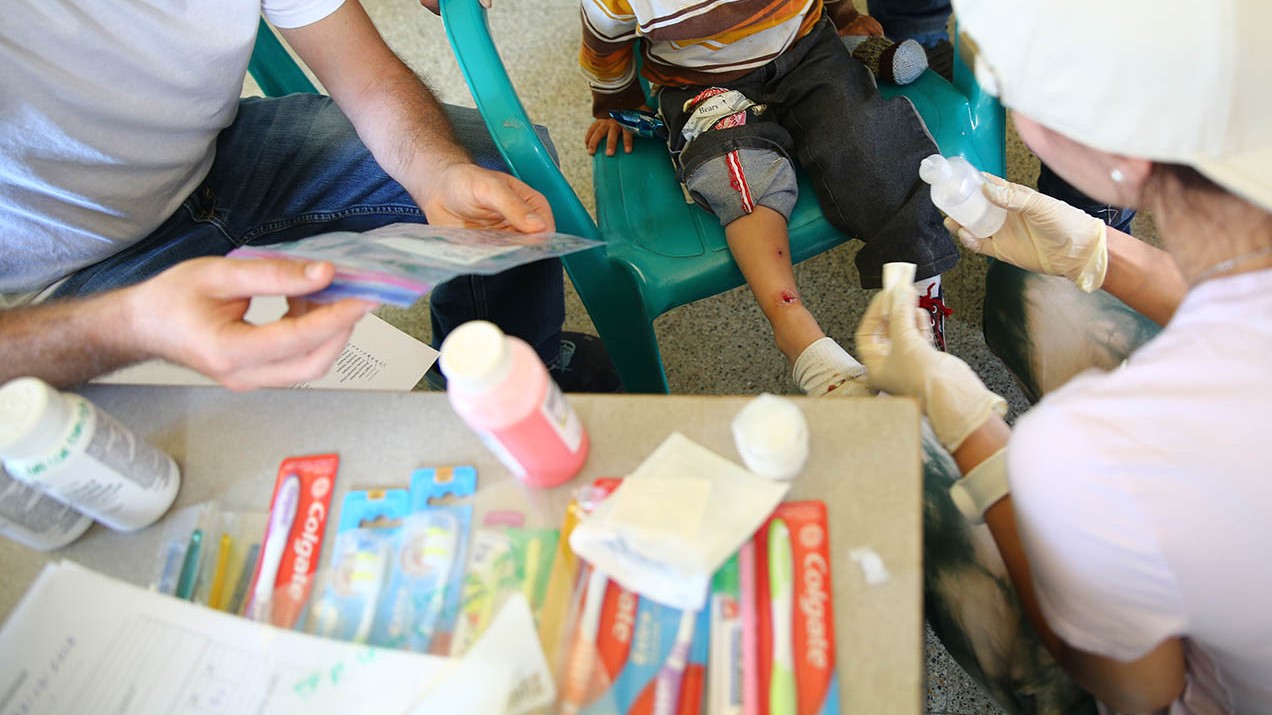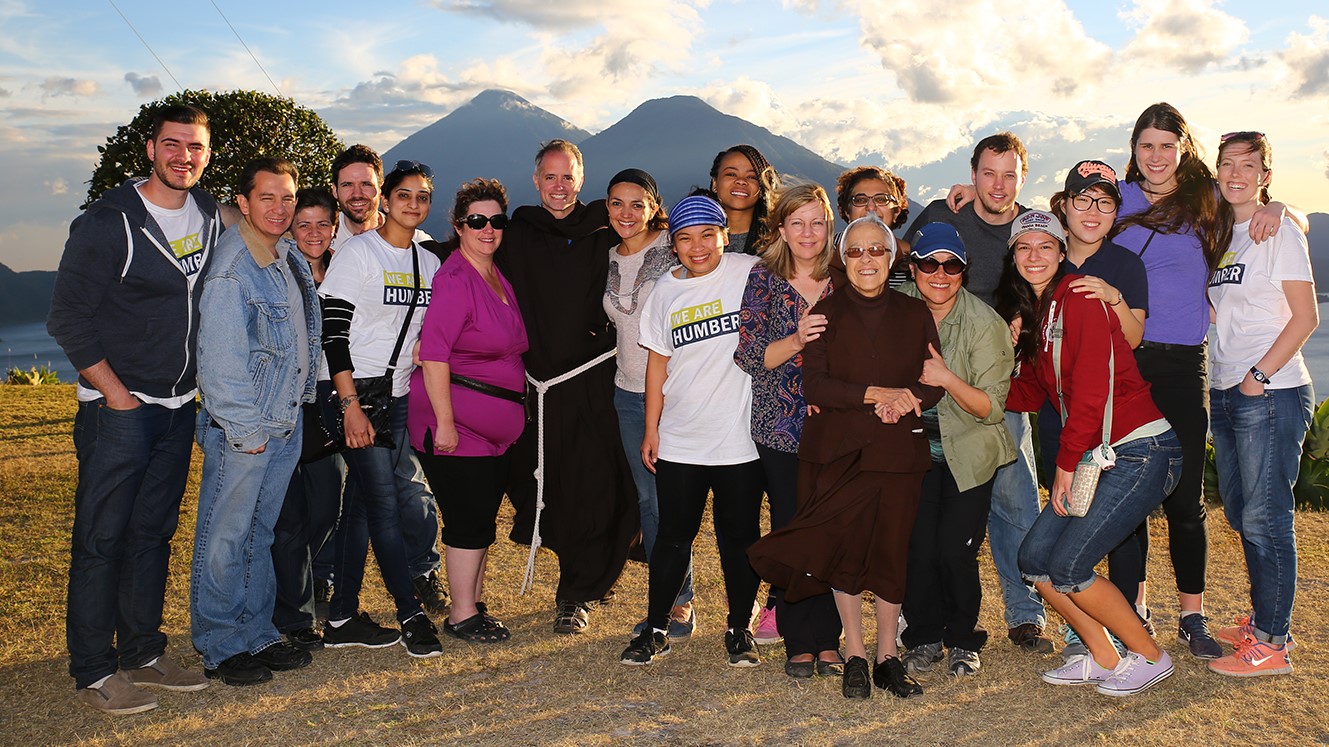Partnering for Health Access: Developing an Innovative Health Clinic

By Saran Davaajargal
Inspiration for research projects can come from anywhere. For Heidi Siu and Frankie Burg-Feret, professors in Humber’s Nursing program in the Faculty of Health Sciences & Wellness (FHSW), inspiration for a research project came from a medical service trip to Guatemala. In 2020, Heidi and Frankie took a group of Humber’s final-year nursing students to Guatemala during the reading week to conduct health assessments for people living in under-resourced communities. It was Humber FHSW’s sixth medical mission trip to Guatemala and one that sparked the inspiration for their research project, “Partnering for health access: Developing an innovative health clinic.”
As the COVID-19 pandemic put new strains on healthcare resources, the research team was motivated to help communities whose limited access to healthcare put them at greater risk of many challenges, including increased poverty, food insecurity and social isolation. Inspired by the impact students had on the community in Guatemala, the research team decided to apply a similar approach back home in Toronto. After discussion with community partners and assessment of the community needs, the team decided to develop a student-nurse-led, faculty-supervised health clinic in collaboration with local partner organizations that serve under-resourced populations.
In 2022, the research team received the highly competitive College and Community Social Innovation Fund (CCSIF) funding of $360,000 from the Natural Sciences and Engineering Research Council of Canada (NSERC) and the Canadian Institutes of Health Research (CIHR).
Inspiration for conducting social innovation research project
Heidi and Frankie state that they conduct social innovation project because they are passionate about the impact it creates on the wider community. Frankie says, “Social innovation projects bring to the forefront the whole purpose of our profession—helping people.”
Heidi notes, “From a social innovation standpoint, if we can anchor our common vision to something as simple as helping people, I think that’s what will sustain the innovation process in and of itself.”

Research team
The research project is co-led by Heidi as the Principal Investigator and Frankie as the Co-Investigator.
Heidi Siu, RN, BScN, MScN, PhD., is a registered nurse and professor in the Bachelor of Nursing Science program at Humber College, with focused research in nursing education, leadership and health services delivery. She has over 20 years of nursing experience in various roles that span clinical practice (in acute cardiovascular care), education, research, administration, policy and regulation. Inspired by her work observations, experiences and relationships with nursing peers, Heidi is committed to identifying innovative strategies that foster empowering environments for work and learning, nursing leadership development and successful health services delivery outcomes.
Frankie Burg-Feret, RN, BScN, MN is a registered nurse and professor in the Humber Bachelor of Science in Nursing Program. She has 35 years of nursing experience working in both the clinical (mother and child) and academic settings. She is also the executive director of a small NGO; a charity committed to assisting vulnerable children in under-resourced countries. At Humber, she leads an annual interprofessional clinical practicum in Guatemala where students and health care professionals work collaboratively to provide care to over 450 children. Humber students return from this immersion experience with an increased awareness of the health disparities in the global world.
Asked about what they are most excited about undertaking the project, Heidi responds, “I’m excited about how the project will help expand students’ leadership capacity and understanding of their potential as future nurses, influencers and advocates in the health care system. The health clinic is intended to be sustainable and long-term, and it’s something we can collaboratively evaluate and work on. Ultimately, I’m most excited about the opportunity to make a meaningful impact on the community.”
Frankie states, “Doing something that is different in order to meet the needs of vulnerable communities. Student learning is an important part of the whole process, but what is driving the project are the people with limited access to health care and how we want to help them.”
Community partner organizations
Using integrated knowledge translation strategies, the clinic will be co-created, implemented, and evaluated with three partner organizations: the Canadian Mental Health Association Peel Dufferin (CMHA Peel Dufferin), Mennonite New Life Centre of Toronto, and St. Francis Table.
CMHA Peel Dufferin provides services for people with mental illness and educates Canadians about mental health issues. In addition to providing different mental health services, CMHA Peel Dufferin is committed to community development, mental health awareness and addressing the stigma surrounding mental illness.
The Mennonite New Life Centre of Toronto is a community-based settlement agency with a mission to facilitate newcomer settlement and integration through holistic services and community engagement, carried out within a gender justice and anti-oppression framework.
{"preview_thumbnail":"/sites/default/files/styles/video_embed_wysiwyg_preview/public/video_thumbnails/84vs0TdwV00.jpg?itok=jpzu5s4z","video_url":"https://www.youtube.com/watch?v=84vs0TdwV00","settings":{"responsive":1,"width":"854","height":"480","autoplay":0},"settings_summary":["Embedded Video (Responsive)."]}
St. Francis Table is the primary expression of Capuchin Outreach, a ministry of the Capuchin-Franciscan Friars and friends. St. Francis Table serves on average 250 meals per day, six days a week, in Toronto’s Parkdale community.
{"preview_thumbnail":"/sites/default/files/styles/video_embed_wysiwyg_preview/public/video_thumbnails/hi_PsFAwx2A.jpg?itok=_oWKyFj5","video_url":"https://www.youtube.com/watch?v=hi_PsFAwx2A","settings":{"responsive":1,"width":"854","height":"480","autoplay":0},"settings_summary":["Embedded Video (Responsive)."]}
While the three partner organizations provide different services, all of them serve vulnerable populations who have inadequate access to the resources they need.
Participation of students
The research team includes three Humber Bachelor of Nursing students as research assistants, Riana Alli, Edward (Wei) Li and Memory Xaverio. The research assistants will be actively involved in different phases of the project—from helping design the clinic model to participating in its evaluation.
In addition to the research assistants, the research project also involves students in various aspects of the project. More recently, the community needs assessment for the research project was conducted by nursing students as part of their community nursing coursework.
We asked the research assistants why they decided to work on the project. Here is what they had to say:
“I’m interested in this social innovation project because I am passionate about its primary goal, which is to bridge the gap caused by the social determinants of health for those who experience barriers to accessing health care through the use of a nurse-led health clinic. I believe this project will help address the specific health needs of individuals in the GTA and build a sustainable method of delivering health promotion and prevention services. Being part of the research team would allow me to advocate for health equity and make a real impact towards changing and improving healthcare access.”
—Riana Alli
“I think the project addresses an important need among vulnerable groups who face added complexities when it comes to accessing health care. As a nursing student, I have learned to see health from a holistic perspective, and this project makes me appreciate some really unique ways in which a nurse-led clinic with integrated community partnerships might benefit clients. By assisting with evaluating the clinic as it unfolds, I get to consider how things like education and social support might be complementary or even necessary for other aspects of care, like taking medications consistently, to come to fruition."
—Edward Li
“Being a nurse, I have compassion to help people. By working with people who experience barriers to care access and those with complex health needs, I feel strongly compelled to facilitate that connection between healthcare and social services for these people. Given that every human being has a social life and that they belong to a community I believe it is important that people live healthy lifestyle within their community with no barriers and that they receive person specific healthcare that addresses their unique needs. The Health Clinic fulfills this need and my involvement in this project will help to fulfil my desire to help people live healthy lifestyles.”
—Memory Xaverio
When asked what they hope to gain from the experience of working as research assistants, the students responded:
“From this experience, I hope to gain a better understanding of the key health issues and healthcare barriers faced among those who are unhoused, experiencing poverty or mental health challenges and addictions. I want to understand what gaps currently exist in the Canadian healthcare system, viewing available resources in contrast to the needs of the population and specific demographics, to ultimately help find possible solutions that would address such needs and problems. Lastly, I am hoping to further develop my research skills, theoretical knowledge, advance my critical thinking and enhance interprofessional collaboration.”
—Riana Alli
“Although I have assisted with lab- and survey-based research in the past, I have always been curious about clinical research that is a bit closer to bedside because of its direct applicability to my future nursing practice. I have learned how to appraise nursing research in school, but through working as a research assistant, I get to learn experientially about how it is produced as well, which kickstarts the development of my capacity for contributing to evidence-based practice. More than anything, it’s a privilege to see this one-of-a-kind project come together to help people at risk for poorer health.”
—Edward Li
“I hope to gain more understanding of social aspects of populations, enhance my research skills and in the process strengthen my analytical skills. This experience will also help me to problem-solve and to develop and manage projects. Since the project involves partnership with other organizations, I will gain competencies on working with other disciplines. I am also eager to learn new skills that come with participating in this project and this will improve my operational ability to use research skills for my nursing career.”
—Memory Xaverio
Potential impact
Travelling to communities to provide health services that might otherwise be out of reach for the population is a key objective of this project. Ultimately, the research team plans to develop a health partnership model that can be adopted by interested academic and community organizations across Canada. Such a model is an innovative approach to effectively bridge the gap between health care and social services and provide better care for people with complex health and social needs.
Get to know more about Heidi and Frankie
What do you like to read or watch?
Heidi’s favourite genres: Documentaries, movies and TV shows with strong storytelling elements
Frankie’s favourite books: Books on spirituality and biographies
What do you do when you are not at work?
Heidi: Travelling, hiking in nature, and playing ultimate frisbee
Frankie: Leading a charity, spending time with her grandsons, travelling
What does “social innovation” mean to you?
Heidi and Frankie: Looking at a problem or an issue and trying to solve that in a new and creative way with intended impact.
What inspires you?
Heidi: What inspires me is seeing what other people are doing with the hope of making things better or trying things in a creative way.
Frankie: I am inspired by my colleagues who are driven to help others through research.

